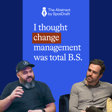
Ep 34: From Prosecuting to Leading In-house at a Tech Startup: S. Michael Lee, GC & COO at Engaging.ai
How do you approach, accept, and move on from career transitions, both planned and unexpected? What does it take to transition from decades in public service to roles leading legal at tech startups and law firms? And how can you leverage your network to bounce back after an unexpected layoff?
S. Michael Lee, General Counsel and COO at Engaging.ai, has conquered many of these tense moments. Starting his career as the first Korean-American prosecutor in the Santa Clara County DA’s Office, he brought lessons learned from his experience as a trial attorney to his second chapter as an in-house counsel and—eventually—legal and business leader.
Hear Michael as he discusses why your network is essential to finding your next role, why you shouldn’t limit yourself or your job prospects, and the importance of honoring your roots in your professional life,
Annual Compensation Report: https://salary-report.spotdraft.com/
Read detailed summary: https://www.spotdraft.com/podcast/episode-34
Topics:
Introduction: 0:00
Honouring your connection to the Korean American community: 2:40
Finding inspiration in your community to work in public service as a prosecutor: 5:36
Applying lessons learned as a prosecutor to the private sector: 11:36
Finding an in-house role after building your career in public service: 12:57
Advice to lawyers in government service trying to move into the private sector: 14:37
Networking to advance your career: 16:57
Dealing with layoffs at Blind: 20:40
Taking on a new GC and COO role at Engaging.ai: 25:04
Advice to lawyers looking for new positions: 26:52
Book recommendation: 28:19
What you wish you’d known as a young lawyer: 29:02
Connect with us:
S. Michael Lee - https://www.linkedin.com/in/s-michael-lee-27ab86/
Tyler Finn - https://www.linkedin.com/in/tylerhfinn
SpotDraft - https://www.linkedin.com/company/spotdraft
SpotDraft is a leading CLM platform that solves your end-to-end contract management issues. Visit https://www.spotdraft.com to learn more.



















